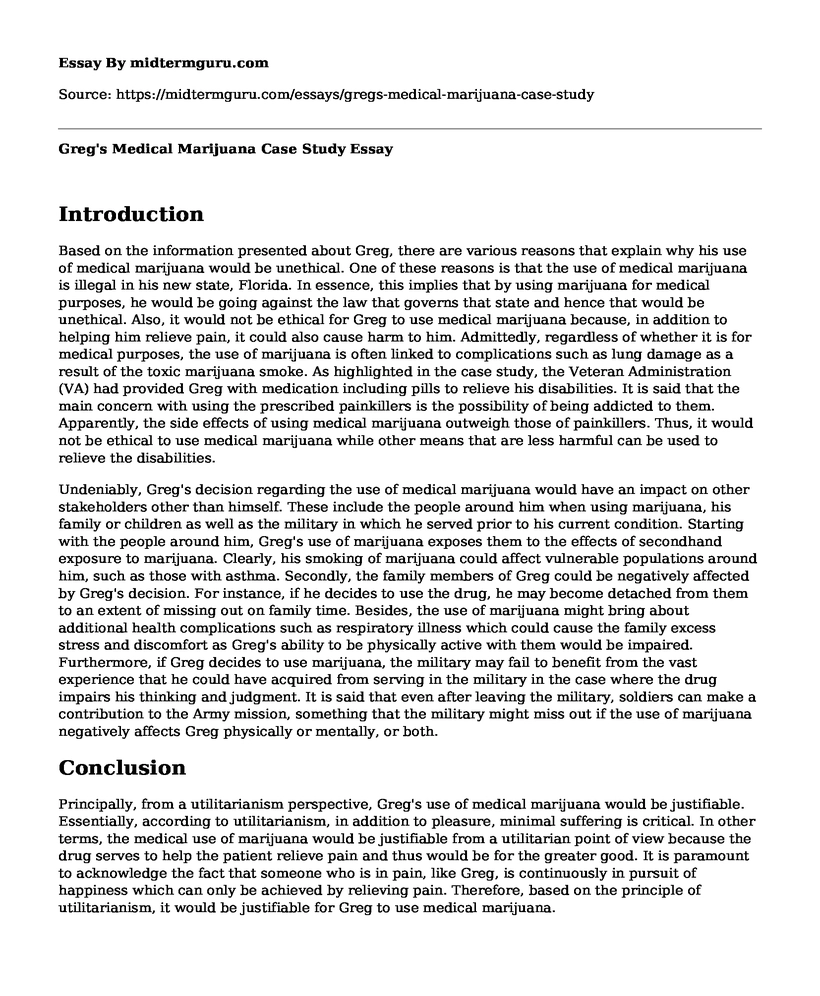Introduction
Based on the information presented about Greg, there are various reasons that explain why his use of medical marijuana would be unethical. One of these reasons is that the use of medical marijuana is illegal in his new state, Florida. In essence, this implies that by using marijuana for medical purposes, he would be going against the law that governs that state and hence that would be unethical. Also, it would not be ethical for Greg to use medical marijuana because, in addition to helping him relieve pain, it could also cause harm to him. Admittedly, regardless of whether it is for medical purposes, the use of marijuana is often linked to complications such as lung damage as a result of the toxic marijuana smoke. As highlighted in the case study, the Veteran Administration (VA) had provided Greg with medication including pills to relieve his disabilities. It is said that the main concern with using the prescribed painkillers is the possibility of being addicted to them. Apparently, the side effects of using medical marijuana outweigh those of painkillers. Thus, it would not be ethical to use medical marijuana while other means that are less harmful can be used to relieve the disabilities.
Undeniably, Greg's decision regarding the use of medical marijuana would have an impact on other stakeholders other than himself. These include the people around him when using marijuana, his family or children as well as the military in which he served prior to his current condition. Starting with the people around him, Greg's use of marijuana exposes them to the effects of secondhand exposure to marijuana. Clearly, his smoking of marijuana could affect vulnerable populations around him, such as those with asthma. Secondly, the family members of Greg could be negatively affected by Greg's decision. For instance, if he decides to use the drug, he may become detached from them to an extent of missing out on family time. Besides, the use of marijuana might bring about additional health complications such as respiratory illness which could cause the family excess stress and discomfort as Greg's ability to be physically active with them would be impaired. Furthermore, if Greg decides to use marijuana, the military may fail to benefit from the vast experience that he could have acquired from serving in the military in the case where the drug impairs his thinking and judgment. It is said that even after leaving the military, soldiers can make a contribution to the Army mission, something that the military might miss out if the use of marijuana negatively affects Greg physically or mentally, or both.
Conclusion
Principally, from a utilitarianism perspective, Greg's use of medical marijuana would be justifiable. Essentially, according to utilitarianism, in addition to pleasure, minimal suffering is critical. In other terms, the medical use of marijuana would be justifiable from a utilitarian point of view because the drug serves to help the patient relieve pain and thus would be for the greater good. It is paramount to acknowledge the fact that someone who is in pain, like Greg, is continuously in pursuit of happiness which can only be achieved by relieving pain. Therefore, based on the principle of utilitarianism, it would be justifiable for Greg to use medical marijuana.
Cite this page
Greg's Medical Marijuana Case Study. (2022, Sep 28). Retrieved from https://midtermguru.com/essays/gregs-medical-marijuana-case-study
If you are the original author of this essay and no longer wish to have it published on the midtermguru.com website, please click below to request its removal:
- Equal Employment Opportunity Commission v Interstate Distributor Company
- Discussion on the Chinese Exclusion Act - Paper Example
- Irregular Immigration: Political, Social, Economic and Cultural Aspects - Essay Sample
- Brie Files Discrimination Charge Against Employer: Legal Process Explained - Essay Sample
- Social Problems in the US: Gun Violence, Racism, and Drug Abuse - Essay Sample
- Reducing Smoking Among Teens: School-Based Prevention and Cessation Programs - Research Paper
- Exploring My Unconscious Racial Bias: Results From IAT Test - Essay Sample







